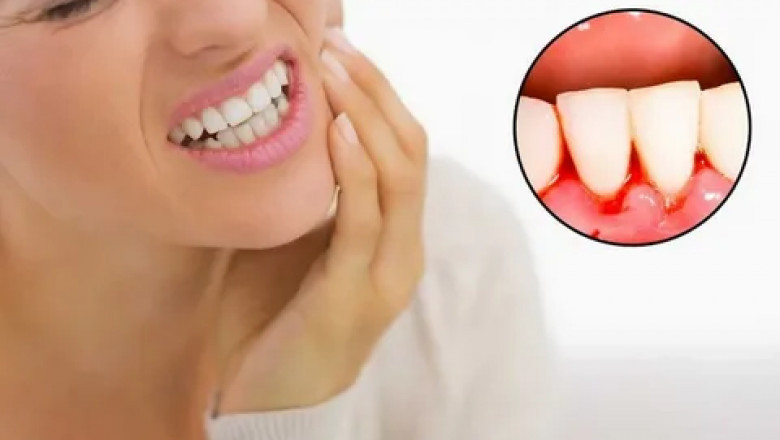views
Bleeding gums and bad breath are common dental problems that many people experience. While occasional bleeding may not be a serious concern, persistent issues can indicate underlying oral health problems. Bad breath, also known as halitosis, often accompanies bleeding gums and can affect confidence in social interactions. Understanding the causes and solutions for bleeding gums and bad breath can help in maintaining good oral hygiene and preventing serious dental conditions.
Causes of Bleeding Gums
Bleeding gums can occur due to several reasons, including poor oral hygiene, gum disease, and certain medical conditions. Some common causes include:
1. Gum Disease (Gingivitis and Periodontitis)
- The most common cause of bleeding gums is gum disease.
- Gingivitis occurs due to plaque buildup along the gumline, leading to inflammation and bleeding.
- If left untreated, it can progress to periodontitis, a severe condition that can cause gum recession and tooth loss.
2. Poor Oral Hygiene
- Not brushing or flossing properly can allow plaque and bacteria to build up, irritating the gums.
- Using a hard-bristled toothbrush or aggressive brushing can also damage the gum tissue, causing bleeding.
3. Vitamin Deficiencies
- A lack of essential vitamins, especially Vitamin C and Vitamin K, can lead to weak gums and increased bleeding.
4. Hormonal Changes
- Pregnancy, menopause, and hormonal changes can make gums more sensitive and prone to bleeding.
5. Smoking and Tobacco Use
- Smoking weakens the immune system and reduces blood flow to the gums, making it harder to fight infections.
6. Certain Medications
- Blood-thinning medications, such as aspirin and anticoagulants, can increase gum bleeding.
Causes of Bad Breath
Bad breath can be caused by poor oral hygiene, food choices, or underlying health issues. Some major reasons include:
1. Poor Oral Hygiene
- Not brushing or flossing regularly allows bacteria to accumulate on the tongue and teeth, leading to bad breath.
2. Gum Disease
- Bacteria in infected gums produce foul-smelling toxins, contributing to chronic bad breath.
3. Dry Mouth (Xerostomia)
- Saliva helps clean the mouth by washing away food particles and bacteria.
- A dry mouth due to dehydration or certain medications can cause bad breath.
4. Food Choices
- Strong-smelling foods like garlic, onions, and coffee can leave a lasting odor.
- Sugary foods can also promote bacterial growth, leading to bad breath.
5. Smoking and Alcohol
- Tobacco and alcohol dry out the mouth and introduce harmful chemicals that worsen bad breath.
6. Digestive Issues
- Acid reflux and stomach problems can cause foul-smelling gases to travel up to the mouth.
Solutions for Bleeding Gums and Bad Breath
Good oral hygiene and healthy habits can prevent and treat bleeding gums and bad breath effectively.
1. Maintain Proper Oral Hygiene
- Brush twice a day with a soft-bristled toothbrush and fluoride toothpaste.
- Floss daily to remove plaque and food particles from between teeth.
- Use an antibacterial mouthwash to kill bacteria and freshen breath.
2. Improve Your Diet
- Eat foods rich in Vitamin C (oranges, strawberries) and Vitamin K (leafy greens) to strengthen gums.
- Drink plenty of water to keep the mouth hydrated and flush out bacteria.
3. Avoid Tobacco and Alcohol
- Quitting smoking and reducing alcohol intake can improve gum health and eliminate bad breath.
4. Visit a Dentist Regularly
- Professional cleanings help remove plaque and tartar that regular brushing cannot.
- Regular check-ups allow early detection and treatment of gum disease.
5. Use a Tongue Cleaner
- Bacteria often accumulate on the tongue, contributing to bad breath.
- Cleaning the tongue daily can reduce odor-causing bacteria.
6. Treat Underlying Health Issues
- If gum bleeding or bad breath persists, consult a dentist or doctor to rule out medical conditions like diabetes or acid reflux.
Conclusion
Bleeding gums and bad breath are often signs of poor oral health but can be managed with proper care. Regular brushing, flossing, and professional cleanings can prevent gum disease and bad breath. A healthy diet, avoiding smoking, and staying hydrated also contribute to fresh breath and strong gums. If the problem persists, seeking professional dental advice can help in identifying and treating any underlying conditions. Taking these steps will ensure a healthy, confident smile.






















Comments
0 comment